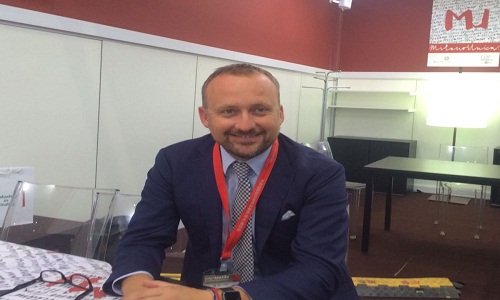FW
"75 top-end exhibitors gather up in Shanghai at Milano Unica Pavilion to showcase their fashion prowess in Hall 6.2, inside SalonEurope Shanghai. Bringing in new consumption pattern and evolving consumer tastes, this pavilion infuses freshness into the entire trade show."

75 top-end exhibitors gather up in Shanghai at Milano Unica Pavilion to showcase their fashion prowess in Hall 6.2, inside SalonEurope Shanghai. Bringing in new consumption pattern and evolving consumer tastes, this pavilion infuses freshness into the entire trade show.

Amid global uncertainties and a falling GDP, China continues to hold nearly half the global luxury market, because of the growing purchasing power of the consumers. Chinese fashion market is witnessing a sea change. Till now, luxury goods were considered a symbol of wealth and status, today it’s all about enhancing experience. The shift has been brought by the so-called millennials, who are educated, well-travelled and tech-savvy, who have absorbed luxury since childhood from their parent’s generation and are now looking for niche high-end and bespoke products.
“The 10th edition of Milano Unica China confirms the strategic importance of made in Italy in this country. We thank the Italian Ministry of Economic Development and ITA (Italian Trade Agency) for making it possible through their economic and organizational support. I also wish to empasise that beyond the menswear textiles, MU China has provided a strong womenswear offer since the beginning and this sector is undergoing the fastest-growing increase in the Country,” says Ercole Botto Poala, President, Milano Unica.
“75 exhibitors feature the F/W 17-18 top-end collections between October 11-13 fair days at Mu China Pavilion and the selected clients’ choices will be guided by the traditional a much appreciated Trend Area located inside the Pavilion of beauty and culture,” states Massimo Mosiello, General Manager of the exhibition.
On asking about the reduced number of exhibitors, Paola says, “I agree that during this edition, the number of exhibitors is much lesser than earlier editions of Intertextile Shanghai edition. This is primarily because many of the earlier exhibitors are not repeating either because they have already got their buyer network done or they are not big enough to keep investing repeatedly as it is not just exchanging business cards, making final business is important, which is not happening very fast. Secondly, with earlier editions of participation of Milano Unica in Intertextile has resulted into many buyers visiting Milano Unica show in Milan earlier this September. Hence, those exhibitors who have already done business with their Chinese buyers have not participated.” Elaborating further, he adds, “I don’t think the number would now ever increase much, unless this exhibition is held in mid-September as business cycles and season requirements are changing quite fast. However, we are happy to note that the bilateral ties between Italy & China are improving.”
Next Milano Unica appointment will be hosted in Milan, at Fieramilano RHO, between February 1-3. With the change in month, Milano Unica F/W edition will be held in July, instead of September from 2017.
High-end streetwear helped boost global sales of luxury personal goods by 5 percent this year to an estimated €263 billion. While streetwear has proven to bring the next generation of consumers into the luxury fold, it is a double-edged sword.
Luxury brands are adapting to changing times and striving to connect with a younger and diverse customer base, grooming the next generation of loyal luxury customers.
Luxury brands and retailers are establishing exclusive design and marketing collaborations with streetwear labels, hip-hop and rap recording artists and entertainers, and fashion and social media influencers.
Several luxury goods labels have profited from hip-hop and streetwear-inspired collections over the past few seasons. Multiple luxury fashion houses, as well as the Louis Vuitton and Givenchy brands, have been partnering with streetwear brands and introducing sneaker- and streetwear-inspired products.
Multiple luxury fashion houses, as well as the Louis Vuitton and Givenchy brands, have been partnering with streetwear brands and introducing sneaker- and streetwear-inspired products.v
Louis Vuitton partnered with the Supreme skateboard brand on a design collaboration that apparently generated €100 million ($117 million) in sales. The collection, which was sold in pop-up stores in major cities worldwide in June 2017.
According to the report the luxury goods companies will increasingly need to innovate and keep up with millennial and Gen Z trends in order to capture and grow sales among the younger generations. The historically conservative luxury goods industry is striving to attract a more diverse and younger client base.
Weaving two types of specially designed fibres with cotton yarn and conductive copper-coated threads, a team of researchers from China and Singapore has devised a smart fabric that can both extract energy from light and store it as a super capacitor would do. As its main threads (used as flying shuttle), the textile combines fibre-shaped photo-anodes interlaced with counter electrodes (CEs) for the energy harvesting functionality, with TiN nanowire-based fibre super capacitors (FSCs) for the part of energy storage.
The paper "Tailorable and Wearable Textile Devices for Solar Energy Harvesting and Simultaneous Storage" published in the ACS Nano journal details the fabrication process of both types of specialty threads as commercially viable for production in any length. The best thing about this textile is that it can be woven with both threads side-by-side in any proportion offering the right balance between energy harvesting and energy storage based on the end applications envisaged.
What's more, the textile can be tailored into any shape while still retaining its overall solar energy harvesting and storage capabilities. Two equal parts of a fabric cut in half providing each roughly half the energy harvesting and energy storage capacity of the integral fabric (as long as the threads' extremities are reconnected in some way to build up functional modules in series or in parallel). In fact, every individual “thread” (FSC, fiber-shaped DSSC photoanode and CE) can be cut while retaining its functionality.
To prove their idea, the researchers weaved a palm-size sample that could be fully charged to 1.2V in 17s by self-harvesting solar energy. It fully discharged in 78s at a discharge current of 0.1mA.
The TiN nano wire-based fibre super capacitors (FSCs) were obtained starting with a Ti wire roughly 250μm in diameter. The titanium wire undergoes an alkali hydrothermal treatment and a further ion-exchange process to obtain H2Ti2O5•H2O nanowires on its surface, about 100nm in diameter.
Vide a notification dated October 7 of the Ministry of Labour and Employment, a Fixed Term Employment has been introduced in Apparel Manufacturing sector in Industrial Employment (Standing Order) Act. The decision would facilitate employment of workers in Apparel manufacturing on fixed term basis in the backdrop of seasonal nature of sector and would also ensure same working conditions, wages and other benefits for fixed term employee in the sector as a regular employee. It is thus win - win situation for both employer's and employees in Apparel manufacturing sector.
The Industrial Employment (Standing Orders) Act, 1946 requires employers to define conditions of employment in their industrial establishments. The item one of the schedule to the Act classifies the workman (a) Permanent (b) Temporary (c) Apprentice (d) Casual (e) Probationer (f) Badlis. The list in this schedule is not exhaustive. The nature of industrial establishments may be a factor to decide the classification of the workmen.
The concept of Fixed Term Employment defines the tenure of employment as well as other associated conditions of service and remunerations which are provided to regular employees under various labour laws. Fixed term employment was defined as a workman who is employed on a contract basis for a fixed period. Thus the services of workman will be automatically terminated as a result of non renewal of the contract between the employer and the workman concerned.
Separation of service of a workman as a result of non renewal of the contract of employment between the employer and workman concerned shall not be construed as termination of employment. This step would ultimately benefit the workers as their working conditions would be at par with the regular employees including social security and other benefits. It would, on the one hand provide flexibility to the employers and on the other hand improve the working conditions of the workers already working for some fixed tenure only by way of contracts. Experts say that it is a win-win situation for both worker and employer as on one side it provided flexibility for employing workers as per the demands of the market while on the other it ensures that worker hired gets equal benefits and working condition at par with the permanent employee.
Growth in Bangladesh’s apparel exports to the United States dropped below one per cent during the first eight months of the current calendar year over the corresponding period of 2015.
The country's exports grew by 0.85 per cent while its one of the main competitors, Vietnam, posted a 3.04 per cent growth. Export earnings grew by 10.99 per cent in January and 8.52 per cent from January to February 2016.
Exports of Bangladesh’s non-apparel items, including shrimp and plastic products, also declined by 6.88 per cent.
During the same period, Chinese apparel exports to the US also witnessed a negative growth of 7.73 per cent. Readymade garment exports from India slightly maintained growth by 0.06 per cent while Cambodia’s exports declined by 14.76 per cent.
A downturn in the US demand for apparels might have slowed down the country’s imports not only from Bangladesh but also from other countries.
Orders from China are shifting to Vietnam, which has developed its strength in producing non-cotton items. Efficiency is higher in Vietnam compared to Bangladesh.
Though India, Vietnam and Bangladesh produce almost the same products, Vietnam produces some value-added products.
Bangladesh is trying for a resumption of GSP but the US is insisting on further improvements in workplace safety and the labor rights situation in the export industry.
Launched in 2011 by six leading brands, Zero Discharge of Hazardous Chemicals Program now consists of 22 signatory brands, eleven value chain affiliates and four associates. Contributors include apparel and footwear companies such as Burberry, Benneton, Gap, H&M, Inditex, Marks & Spencer, Nike, Puma and Adidas.
The program envisions widespread implementation of sustainable chemistry to protect consumers, workers and the environment. It aims to harmonise standards across the textile and footwear value chain (including leather) to support safer chemical management.
A key component of the program is its manufacturing restricted substances list, which restricts the use of hazardous chemicals used across the manufacturing process.
Among members are Adidas, Nike, Levi Strauss, Puma, C&A, Esprit, G-Star Raw, H&M, Inditex, Jack Wolfskin, Li Ning and New Balance.
Four new members are Netherlands based leather chemical manufacturer Stahl, leather manufacturer PrimeAsia, ADEC Innovations (an impact investing company that designs, develops and delivers diverse data management and technology solutions) and Lanzhou Ketian New Materials (a leading supplier of Chinese waterborne synthetics).
The program has completed chemical use and management surveys and wastewater testing for approximately 150 substances at 20 facilities in Bangladesh, China, India, Taiwan and Vietnam. It’s working on compiling information on chemicals used in the textile industry.
Chinese small and medium enterprises are keen to set up manufacturing bases in India and Bangladesh to take advantage of lower labor costs. These are mainly original equipment suppliers, which do not have their own brands.
As part of a pilot research they have visited West Bengal, Assam, Orissa and Telengana to explore opportunities. Businesses they are particularly interested in are textiles and garments, furniture, plastics, machinery, household items, and electronics.
Apart from taking advantage of lower labor costs, they feel they can market their products domestically and export to other markets. Chinese companies are particularly keen to engage with small and medium enterprises as they need linkages unlike big companies which can find their way anywhere.
If the production data of textiles are any indicator, India has a great potential for collaboration with Chinese companies. China accounts for nearly ten times the textile business generated in India.
Chinese investments in India grew six-fold in 2015 from the previous year while more investments are in the pipeline following easing of restrictions on Chinese firms and favorable tax rates.
India has liberalised the investment climate for Chinese investors by removing visa and security restrictions. The bilateral trade deficit is in favor of China.
Gujarat is formulating a retail trade policy.
Maharashtra, Andhra Pradesh and Karnataka already have such policies for retailers.
In the wake of the approval of the Model Shops and Establishments Act, as well as increased competition from online retailers, the trading community in Gujarat wanted a state-specific policy for development and protection of the retail trade sector, especially the unorganized retail trade segment.
Traders belonging to unorganized retail say they are facing tough competition from deep-pocketed organized retail giants and want institutional support in the form of a dedicated policy which will help small retailers survive amid the fierce competition.
As a first step to creating the retail policy, the state government has sought suggestions from industry associations such as the Retail Trade Association of India and the Gujarat Chamber of Commerce and Industry. These trade bodies have been asked to come up with suggestions before October 15, 2016.
A meeting will also be convened in the second half of this month to consider suggestions made by industry representatives.
The policy is under consideration. There will be interactions with various stakeholders and certain issues need to be debated. After the consultation process, the policy will be taken up for approval.
Interfiliere Shanghai will be held in China, October 12 to 13, 2016.
Fabrics and accessories samples from exhibitors will feature qualities such as comfort, protection (anti-UV, antibacterial, anti-abrasion), breathability, quick-drying, heat-regulation, connected and innovation.
Information panels and video presentations will be held to explain the latest technological advances in bonding/lamination, seamless knitting, coating, laser-cutting and other technologies.
Also on display will be innovations from other industry sectors such as 3D printed silk, boxer-shorts with protection against harmful waves, a wallet using electromagnetic induction for wireless phone-charging, and shoes made from recycled oyster-shells.
The athleisure section will present the latest trends in sportswear and the evolution of active wear. It will shine a spotlight on how new, innovative fabrics can be mixed and matched. Fabric surface textures, double knits and engineered athleisure lace will also be featured.
The lingerie forum will continue to play a central role, revealing trends for autumn/winter ’17-’18 and showcasing the technical innovations of the latest must-have products. A dedicated area called the beach forum will showcase fabrics, accessories, and finished products for swimwear, beachwear and sportswear.
Seminars and conferences will cover trends, branding, technology, and industry hot topics. The seminar will highlight active wear materials and interpret active wear and merchandising trends.
Innovate, integrate and motivate’ are the three major requirements for the Indian apparel industry. The same is the theme of 12th International Conference on Apparel & Home Textiles (ICAHT-2016). Organized by Okhla Textile and Garment Cluster (OGTC), a prominent organization of Delhi-NCR-based apparel exporters to promote the industry and work for its collective growth, the conference will be held on October 15 in New Delhi.
According to RC Kesar, DG, OGTC, the event will give a complete solution to develop understating on current scenario of apparel export industry as there will be technical presentations and specific skill workshops throughout the day. On the occasion, Aisshvarya S. Shah CEO & Chief Trainer, Work Senses will speak on ‘HR – A Business Partner’ while Ranjiv Kapur, COO, Triburg will discuss on ‘A Turnaround Journey – Cost profitability’.
‘Cost Management in World Class Manufacturing’ will be discussed by Charles Dagher of Dagher Consulting Group while Prashant Agarwal, Business JMD, Wazir Advisors, and Hiroshi Tachikawa, MD, Propharm Japan Co. Ltd. will talk on ‘Strategy to Improve Profitability in Garment Industry’. ICAHT is a platform for the owners of apparel export houses and middle-level management. This is the occasion when all affiliates can participate and try to learn new things.












